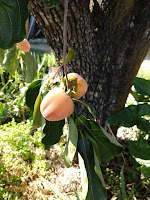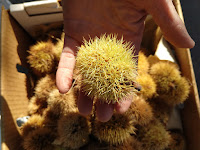Please note: Shortened hours for Sunday Nov. 6. 11 AM to 3 PM.
Persimmon season is starting. The crop is light this year, so we expect the season will be short. The Maru and Nagamaru, brown fleshed persimmons are now in season. If these were pollinated in the spring, seeds will form. The seeds will influence the flesh to become brown and sweet. We look at the shape and color of the mature fruit and make a GUESS as to its sweetness. Many times only half the fruit is sweet. Sometimes our guess is off target. Hyakume are also beginning to mature. They are similar to the other brown fleshed persimmons but the flesh is more a "sprinkled cinnamon" in color. When we think they will be mostly puckery, we treat them with vodka to sweeten them.
Fuyu persimmons are perhaps the most popular. No guessing for this variety. They are always sweet. They are also the last variety to mature. The ones we are harvesting now are on the crisp yellow side. In a week they will be getting deeper in color and sweeter but eventually go from crisp to a crunch.
We use Hachiya and Gyombo persimmons to make hoshigaki (Japanese dried persimmons). These persimmons are in short supply at our farm and other farms in the area this year. Our hoshigaki production will be much smaller. Thankfully we are able to buy some hachiya persimmons from other farmers. Smaller and blemished fresh hachiya are available in the farm stand. A few are starting to get soft.
In the past we took orders for hoshigaki. With the shortage this year we can't possibly fill all requests. We are asking people to call a day or two before coming to pick up hoshigaki. We can then let you know if any is available for us to save for you. Things may change so keep checking this page on our website. If we have enough for mail order we will link this page to an order form. There is no order form at this time. Also due to the shortage of hachiya persimmons, the need to purchase persimmons to dry, and continuing farm expenses that we would like to cover, the price will definitely be much higher than in past years. It looks like we will need to limit the quantity of hoshigaki people can buy so that more people will get some. As farmers often do, we are hoping for a better crop next year.
Winter Squash of many descriptions is now available. We have Butternut, Kabocha, and Black Futsu. WoodRose Gardens is bringing us Spaghetti squash and occasionally a large green squash. The gardens are putting out a last hurrah. We have chilies, tomatillos, long beans and okra. WoodRose garden has tomatoes, squash, cucumbers, beans peppers, eggplant, chilies and herbs. Kijani Farm brings us Kale and Chard.
REMINDER: SHORT HOURS FOR SUNDAY NOV. 6 11 AM TO 3 PM
REGULAR SEASON HOURS:
TUESDAY THRU SATURDAY 10:00 TO 6:00
SUNDAY 11:00 TO 5:00
CLOSED ON MONDAYS
Here is what we have at the Farm Stand from Otow Orchard:
Apples:
Granny Smith: 🍏Sweet tart, green skinned apple. Retains shape when cooked or baked. Can also be enjoyed fresh.
Asian Pears:
Okusankichi: Generally large crisp and juicy. Refreshingly sweet. A good keeper for winter enjoyment.
Jujube:
About the size of a date, this Asian fruit starts off greenish yellow,
smooth and crisp with the consistency of apple. It is low acid and
contains a date-like seed. As it matures it becomes sweeter and brown
then wrinkled and soft. It is enjoyed at all stages. When dried it is often used in clear soup.
Brown Fleshed Persimmons: Maru, Nagamaru (Chocolate), Hyakume
Hachiya: Must be soft to be sweet. Eaten out of hand or used in baking. Mild distinct persimmon flavor.
Gyombo: Must be soft to be sweet. Similar to Hachiya with a different flavor, sweeter and more liquid.
Fuyu: Crisp and sweet. Eaten fresh like an apple or sliced into salads.
Frozen persimmon pulp.
Honey 🍯 from bees 🐝 at Otow Orchard. Bee pollen from bees 🐝 at Otow Orchard
⚘ Calendula Salve and Lip Balm
Long beans: long green beans, use like regular green beans. These are tender and cook quickly. (limited supply)
Winter squash:
Kabocha: Green shell with thick, sweet, nutty, dry flesh. Traditional Japanese pumpkin. Often steamed with soy sauce, broth and mirin.
Black Futsu: The black bumpy shell turns orange when mature.
Sweet flesh with fruity background. Can be roasted, steamed, baked,
fried and even made into pie.
Butternut: Pinkish beige shell yields a neck of solid flesh and
a small seed cavity. Smooth, sweet flesh can be baked, steamed, or
roasted. Can be added to soup, stir fry, stews.
Hot peppers🌶:
Buena Mulata hot peppers.
Jalapenos
Aji Amarillos: Peruvian chili peppers
Shishito: Japanese chili peppers that may or may not be hot.
Fish
Tomatillos: green tomato like vegetable often used in green salsa.
Okra: Little green slimy vegetable. Great when fried with cornmeal.
Here is what we have from other producers:
Sunnyslope Farm in Granite Bay,Conventionally Grown: Granny Smith apples. 🍏 Sweet tart eaten out of hand or for baking and cooking. Known for keeping their shape when cooked and maintaining a white color when sliced.
WoodRose Country Gardens
in Granite Bay: (organic practices) Sun-dried San Marzano tomatoes, Sweet cherry peppers, 🌶Jalapenos, Serrano, and Poblano chilies. Greek oregano 🌿🌿, rosemary,
thyme,
and basil. Winter squash: Spaghetti squash, and Delicata
squash.
Short supply of: summer squash, cucumbers, Armenian cucumbers, eggplant, bell
peppers, 🍅 slicing tomatoes, cherry tomatoes.
Kijani Farm in Granite Bay:(organic practices) Fresh Swiss chard, 🥬 kale, and cherry tomatoes on the vine.
Top O' the Hill Apiary in Granite Bay: Honey🍯. Top of the Hill Apiary also has bees wax 🐝.
La Bella Vito Farm in Loomis is bringing us fresh🥚 eggs from pastured 🐔🐔chickens (limited supply).
Mihara Farm in Lincoln, conventionally grown: Kiwi: 🥝 Green fleshed and sweet.
Lupi Farm in Granite Bay (no spray): Quince: Yellow ancient fruit in the pear/apple family. Seldom eaten raw. It is hard and needs to be cooked and sweetener added. It is very fragrant and high in pectin. Used to make jelly, quince paste, quince candy (Dulce de Membrillo). It can be added to apple sauce or cranberry sauce for flavor. Great with pork dishes or pork stew.


